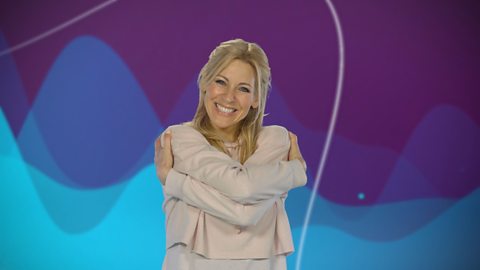Karim Zeroual:
OK Super Movers, it's time to learn about looking after ourselves and taking on new challenges.
Are you ready?
And Pudsey, are you ready too?
OK, here we go now!
From the moment that you wake up and you leap out from your bed.
There's so much new stuff to try, so much excitement up ahead.
Let's take the brand new challenge, let's try out all these new things. A game or sport, an instrument, or maybe you can sing!
Take a look up and step outside.
We can do it smart and safely. Let's give it a try. Rise up! (Rise up) and look after yourself. When we look after our mind, we can look after our health. Rise up! (Rise up) You've got to treat yourself kind.
Because a super happy body brings a super happy mind.
A new subject at school, a sculpture you can make. When we take on the new challenge it's okay to make mistakes.
It's okay to drop the ball, as we'll always get things wrong. Ask some questions, keep improving, then one day we'll be strong.
When we keep our bodies active, there's a bonus we can find. Yeah, it helps our bodies, but it also helps our mind.
Walk to school if you live close by.
Why not cycle if you can?
Let's all keep our bodies happy. It's the Super Moving plan.
Take a look up and step outside!
Looking after ourselves there's no need to hide. Rise up! (Rise up) and look after yourself.
When we look after our mind, we can look after our health.
Rise up! (Rise up) You've got to treat yourself kind.
Because a super happy body brings a super happy mind.
As we get older there comes freedom and responsibilities. (We've got the freedom to try even more new things!).
Real exciting challenges, thinking independently. It's what growing up is all about.
If we keep a healthy body and maintain a healthy mind, we'll find a brand new confidence with the powers that we find!
Exploring our surroundings and trying out new things.
Looking after ourselves. Let me hear you sing
Rise up! And look after yourself.
When we look after our mind. We can look after our health.
Rise up! Rise up! You've got to treat yourself kind because a super happy body brings a super happy mind.
(Yawn) OK Super Movers, it's time for a really good sleep because that's important too.
Let's look after our bodies and minds and stay active.
And let's try new things safely.
That's what it's all about.
Pudsey and Karim Zeroual perform this catchy Super Mood Movers song about looking after yourself and taking on new challenges.
After viewing, singing and dancing along, your class could try some of these activities to further explore their learning:
Activities
- Song lyric: Listen to the song lyrics with the class. Ask pupils to work in pairs to choose their favourite two lines. Encourage the children to share and explain their choices. Ask: 'Why do we need to remember to look after ourselves?' Agree with pupils that we sometimes get so busy with our daily lives we forget to look after our health and wellbeing. So it's important to make looking after ourselves part of our daily routine.
- Word list: Write this list of words on the blackboard or whiteboard: active, safe, well, fit, confident, independent, mental health, physical health. Ask: 'What do these words mean to you?' gather pupils’ responses and ask each pupil to choose two items and write a paragraph about each, describing its importance when looking after yourself.
- Safety leaflets: There are lots of ways to keep ourselves safe in daily life. Ask children to work in pairs to research and design a leaflet showing children how to stay safe in a variety of situations. They could suggest suitable leaflet titles, for example, How To Stay Safe In The Park, How To Stay Safe In The 91Čȱ¬, How To Stay Safe From Germs, How To Look After Your Teeth, How To Stay Safe On The Roads, How To Stay Safe Around Electricity or How To Stay Safe At The Seaside. Pupils could share their completed leaflets with the whole class or in assembly.
- Do you have to be sporty to enjoy keeping fit?: Ask - 'Do you have to be sporty to enjoy keeping fit?' Guide the pupils' responses to the idea that there are many ways for them to look after themselves by taking part in team sports, but also by walking, swimming, cycling, running, dancing, skipping, individual exercise and just playing outside. If you find something you enjoy, it's easier to make it part of your daily or weekly life.
- Day chart: Pupils could keep a chart for a week, noting the things they did to look after their health and wellbeing each day. Did they do a physical activity that got them out of breath? Did they manage to make time to relax? Make the point that keeping active, however you do it, will boost your mood. Mind and body together help you look after yourself. When you're active you boost your physical and mental health.
- A good night's sleep: Ask - 'How can you get a good night's sleep?' Encourage children to share their ideas, which might include: 'go to bed at the same time each night; have a routine, such as listening to or reading a bedtime story to relax you; put your screens away before bed; do lots of physical activity in the day, so you are tired at bedtime.' Children could choose, review and recommend good bedtime stories to the class and set up a 'good night's sleep' shelf of books their fellow pupils can borrow.
- How to seek help for yourself: Ask - 'If you felt worried about something, who could you turn to for help?' Guide children to consider how family, friends and trusted adults can provide help in times of difficulty. Establish that children can always ask a member of school staff for help, even with problems beyond school. Reassure the class: 'It's OK to ask for help. Everyone needs somebody's help at some time.'
- How to seek help for others: Ask - 'If someone else is hurt or needs help, what should you do?' Children could discuss the question in pairs or small groups and then feed their views back to a whole-class discussion. Establish that children should seek help from a trusted adult. With injuries, they can call 999 if they think someone's life is in danger or 111 if the person is in difficulties but their life is not in danger.
- Poems: Give pupils the opening line of a poem: 'Take care of yourself and you can take on the world'. Ask pupils to come up with the rest of the verse.
Learning aims or objectives
The Super Mood Movers song Look After Yourself and these activity notes address the following learning objectives from the curriculum guidance of the four UK nations.
England, PHSE and RSE
From the PSHE Association programme of study:
- H1. how to make informed decisions about health.
- H2. about the elements of a balanced, healthy lifestyle.
- H3. about choices that support a healthy lifestyle.
- H4. how to recognise that habits can have both positive and negative effects on a healthy lifestyle.
- H7. how regular (daily/weekly) exercise benefits mental and physical health.
- H8. how sleep contributes to a healthy lifestyle; routines that support good quality sleep.
- H9. the importance of personal hygiene and how to maintain it.
- H15. that mental health, just like physical health, is part of daily life.
- H16. strategies and behaviours that support mental heath - including how good quality sleep, physical exercise/time outdoors… and spending time with family and friends can support mental health and wellbeing.
From the RSE guidance:
- Caring for other family members:
- the importance of spending time together and sharing each other’s lives.
- How important friendships are in making us feel happy and secure.
- How to seek help or advice from others if needed.
- The importance of self-respect and how this links to their own happiness.
- Physical health and fitness:
- The characteristics and mental and physical benefits of an active lifestyle.
- The importance of building regular exercise into daily and weekly routines and how to achieve this; for example walking or cycling to school, a daily active mile or other forms of regular, vigorous exercise.
- Healthy eating:
- What constitutes a healthy diet
- Health and prevention:
- The importance of sufficient good quality sleep for good health.
- About dental health and the benefits of good oral hygiene.
- About personal hygiene and germs including bacteria, viruses, how they are spread and treated, and the importance of hand-washing.
Northern Ireland, PD&MU
From the Northern Ireland curriculum for Personal Development and Mutual Understanding:
- Self-awareness:
- Their self- esteem, self-confidence and how they develop as individuals.
- Explore and examine what influences their views, feelings and behaviour.
- Feelings and emotions:
- Examine and explore their own and others’ feelings and emotions.
- Know how to recognise, express and manage feelings in a positive and safe way.
- Health Growth and Change:
- How to sustain their health, growth and well-being.
- Understand the benefits of a healthy lifestyle, including physical activity, healthy eating and rest.
- Recognise what shapes positive mental health.
- Safety:
- Know where, when and how to seek help.
- Relationships:
- Recognise the benefits of friends and families.
- Learning to live as members of the community:
- Playing an active and meaningful part in the life of the community and be concerned about the wider environment.
Scotland, PSE
From the Education Scotland Personal and Social Education benchmarks:
- I am experiencing enjoyment and achievement and taking part in energetic physical activities, including sport and opportunities for outdoor learning (HWB 2-25a).
- I can explain why I need to be active on a daily basis to maintain good health and try to achieve a good balance of sleep, rest and physical activity (HWB 2-27a).
- I understand that a wide range of different kinds of friendships and relationships exists (HWB 2-44a).
- I am identifying and practising skills to manage changing relationships and I understand the positive impact this can have on my emotional wellbeing (HWB 2-45a).
- I am developing the skills to keep myself safe and get help if I need it (HWB 2-49a).
From the Curriculum for Excellence Health and Wellbeing Experiences and Outcomes:
- Mental and emotional wellbeing:
- I am aware of and able to express my feelings and am developing the ability to talk about them (HWB 1-01a / HWB 2-01a).
- I know that we all experience a variety of thoughts and emotions that affect how we feel and behave and I am learning ways of managing them (HWB 1-02a / HWB 2-02a).
- I understand that there are people I can talk to and that there are a number of ways in which I can gain access to practical and emotional support to help me and others in a range of circumstances (HWB 1-03a / HWB 2-03a).
- I know that friendship, caring, sharing, fairness, equality and love are important in building positive relationships. As I develop and value relationships, I care and show respect for myself and others (HWB 1-05a / HWB 2-05a).
- I understand the importance of mental wellbeing and that this can be fostered and strengthened through personal coping skills and positive relationships. I know that it is not always possible to enjoy good mental health and that if this happens there is support available (HWB 1-06a / HWB 2-06a).
- I am learning skills and strategies which will support me in challenging times, (HWB 1-07a / HWB 2-07a).
- Physical wellbeing:
- I am developing my understanding of the human body and can use this knowledge to maintain and improve my wellbeing and health (HWB 1-15a / HWB 2-15a).
- I am learning to assess and manage risk, to protect myself and others, and to reduce the potential for harm when possible (HWB 1-16a / HWB 2-16a).
- I know and can demonstrate how to keep myself and others safe and how to respond in a range of emergency situations (HWB 1-17a / HWB 2-17a).
Wales, PSE
From the Personal and Social Education Framework for 7 to 19-year-olds in Wales:
- Active citizenship - to develop respect for themselves and others; to value families and friends as a source of mutual support.
- Health and emotional well-being - take increasing responsibility for keeping the mind and body safe and healthy; feel positive about themselves and be sensitive towards the feelings of others; to understand the features and physical and emotional benefits of a healthy lifestyle, e.g. food and fitness; the range of their own and others’ feelings and emotions; what to do or to whom to go when feeling unsafe.
- Sustainable development and global citizenship - to appreciate the natural world as a source of inspiration.

More from Super Mood Movers:
Wellbeing. video
Naomi Wilkinson performs this comforting Super Mood Movers song about taking care of our mental wellbeing.

Rights and respect. video
Rhys Stephenson performs this stirring Super Mood Movers song about respecting ourselves and others.

Change is life. video
Karim Zeroual and Southampton mascot Sammy Saint perform this heartening Super Mood Movers song about how change is a part of life.

Giving something back. video
Sammy Saint and Billy Badger perform this memorable Super Mood Movers song about coming together and giving something back.

We are citizens! video
Rhys Stephenson performs this lively Super Mood Movers song about being good citizens.
